体验商务英语视听说unit 3
- 格式:ppt
- 大小:8.90 MB
- 文档页数:11


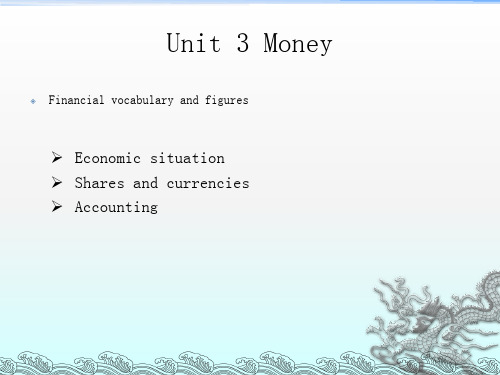
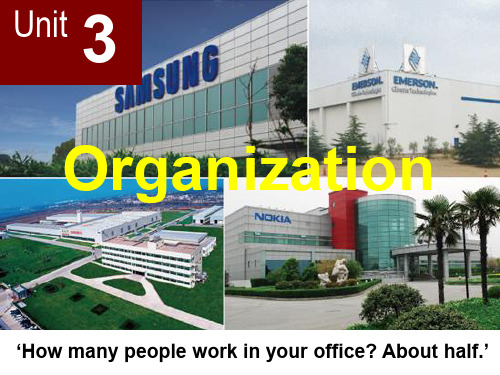
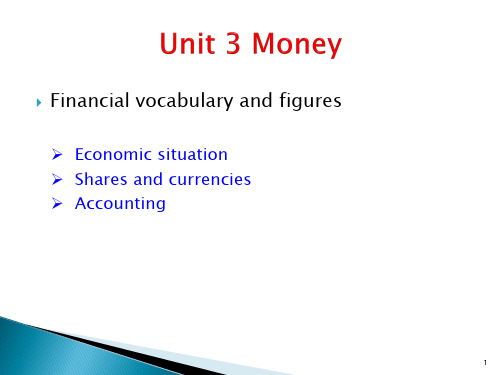




新视野商务英语视听说(第二版)第三单元听力原文------------------------------------------作者xxxx------------------------------------------日期xxxxUnit 3Part 2Task2.2A: Good morning, Paper Mills plc. How can I help you?B: Good morning. Can I talk to Pail Osman, please?A: Who’s calling please?B: Simon Weller, calling from Singapore.A: Well, Mr. Weller, I’m afraid Mr. Osman is not available at the moment. He has just left for a workshop.B: What time do you expect him back? I need to talk with him.A: He told me he would come back in half an hour. Can I take a message or would you like to call him on his cellphone?B: I’ll try his cellphone. Could you give me the number, please?A: That’s right.B: Thank you. Bye.Part 32.Operator: Hello, ABC Ltd. How can I help you?Paul: This is Paul Jackson of Grandiose. Can I have extension 3421, please?O: Certainly, hold on a minute, I’ll put you through.Roy: Louise Paulson’s office, Roy speaking.P: This is Paul Jackson calling. Is Louise in?R: I’m afraid she’s out at the moment. Can I take a message?P: Yes. Could you ask her to call me at 979-326-8965. I need to talk to her about the order; it’s urgent.R: Could you repeat the number please?P: Yes, that’s 979-326-8965 and this is Paul Jackson.R: Thank you Mr. Jackson. I’ll make sure Louise gets this as soon as possible.P: Thanks. Bye.R: Bye.Part 4Video 1Receptionist: Hello, International sales.Schulz: Hello, this is Mr. Schulz here, calling from England.R: Yes, Mr. Schulz. Who do you want to speak to?S: I’d like to speak to Mr. Matthews.R: Fine. Hold the line, please. I’m connecting you now.Perez: Hello. Mr. Matthews’ office. Who’s calling please?S: This is Mr. Schulz calling from England. Can I have a word with Mr. Matthews?P: I’m afraid Mr. Matthews isn’t available. He’s gone to Hong Kong on business for a few days.S: When do you expect him back?P: He’ll be back on Friday afternoon. Is it urgent?S: Yes.P: Can I take a message for him?S: Yes, please. Will you tell him that we’ve just received your sample of the new assembly coffee table and are quite happy with it?P: Sure. It’s very kind of you to say so. Can we expect an order from you?S: That’s why I’m making the call. Please tell Mr. Matthews we’re quite happy with the quality and design of the table, but the price is too high. We need some negotiation on it.P: OK, Mr. Schulz. Anything else?S: One more thing. Please inform Mr. Matthews that I won’t be able to get to your company that early this Saturday because of the rail strike. It’ll probably be afternoon before I arrive.P: No problem. I’ll give him the message.S: Thanks.P: You’re welcome. Goodbye.Part 51(1).Bennett is a famous doctor. Please call him on 875-9368 before you go to see him.(2).Miss Black is on holiday now. The telephone number of the hotel she is staying in in 305-636-8430.(3).The number of the order is 5312/A12.(4).This is John Bartholomew, B-a-r-t-h-o-l-o-m-e-w.(5).The name is Holt & Frier: H-o-l-t and f-r-i-e-r.(6).The name of the company is DINER.D for Dora, I for Island, N for Northpole, E for Edward, and R for Richard.Part 6Video 2Receptionist: Good afternoon, this is DNM, How can I help you?Mandel: Good afternoon. I’d like to speak to Mr. Miller, please.R: Mr. Miller? Hold on, please. I’ll connect you.Leo Miller: Mr. Miller speaking. Who’s calling please?M: This is Ms. Mandel from BCM. Is this Henry Miller?L: What? Henry Miller? No, this is Leo Miller, in the Sales Department. Henry Miller is in the Customer Relations Office. I’m afraid you’ve dialed the wrong extension. M: Oh, sorry to have interrupted you. Can you give me Henry Miller’s extension, please?L: Sorry, I haven’t got a directory on hand now. Would you mind calling the switchboard again? I’m sorry not to be of more help.M: Oh, OK. It doesn’t matter. I’ll call back to the receptionist. Thank you, anyway. R: Good afternoon. How can I help you?M: Good afternoon. This is Ms. Mandel again. I’m afraid you gave me the wrong extension just now. I want to speak to Henry Miller, not Leo Miller.R: Oh, there are two Mr. Millers in our company. I’m very sorry I didn’t notice that. I’ll put you through right now. Please wait a minute.M: OK. I’m holding.R: Good afternoon. How can I help you?M: It’s me again – Ms. Mandel. I’m still having trouble getting through to Henry Miller. No one is answering his line. I really need to talk to Mr. Miller as soon as possible. We placed an order with you last week, but we have so far heard nothing about it. It’s a rush order, and we need it urgently. Can you help?R: Of course. I’ll go and find him and ask him to ring you immediately. There may be a problem with his line.M: OK, thank you very much.Hello, Mr. Miller, this is Ms. Mandel. Thank you for ringing back. You are hard to get hold of!H: Oh, I’m terribly sorry for the trouble. I was in a meeting and I left my cellphone in my office.M: Oh, OK. Mr. Miller, I’m calling you about…。
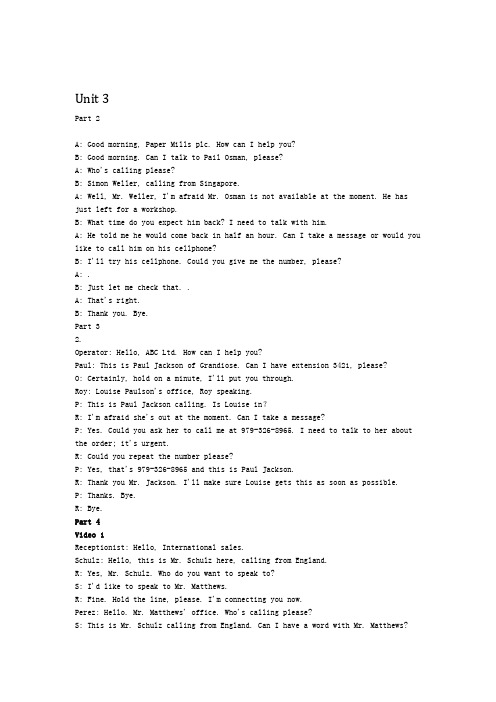
Unit 3Part 2A: Good morning, Paper Mills plc. How can I help you?B: Good morning. Can I talk to Pail Osman, please?A: Who's calling please?B: Simon Weller, calling from Singapore.A: Well, Mr. Weller, I'm afraid Mr. Osman is not available at the moment. He has just left for a workshop.B: What time do you expect him back? I need to talk with him.A: He told me he would come back in half an hour. Can I take a message or would you like to call him on his cellphone?B: I'll try his cellphone. Could you give me the number, please?A: .B: Just let me check that. .A: That's right.B: Thank you. Bye.Part 32.Operator: Hello, ABC Ltd. How can I help you?Paul: This is Paul Jackson of Grandiose. Can I have extension 3421, please?O: Certainly, hold on a minute, I'll put you through.Roy: Louise Paulson's office, Roy speaking.P: This is Paul Jackson calling. Is Louise in?R: I'm afraid she's out at the moment. Can I take a message?P: Yes. Could you ask her to call me at 979-326-8965. I need to talk to her about the order; it's urgent.R: Could you repeat the number please?P: Yes, that's 979-326-8965 and this is Paul Jackson.R: Thank you Mr. Jackson. I'll make sure Louise gets this as soon as possible.P: Thanks. Bye.R: Bye.Part 4Video 1Receptionist: Hello, International sales.Schulz: Hello, this is Mr. Schulz here, calling from England.R: Yes, Mr. Schulz. Who do you want to speak to?S: I'd like to speak to Mr. Matthews.R: Fine. Hold the line, please. I'm connecting you now.Perez: Hello. Mr. Matthews' office. Who's calling please?S: This is Mr. Schulz calling from England. Can I have a word with Mr. Matthews?P: I'm afraid Mr. Matthews isn't available. He's gone to Hong Kong on businessfor a few days.S: When do you expect him back?P: He'll be back on Friday afternoon. Is it urgent?S: Yes.P: Can I take a message for him?S: Yes, please. Will you tell him that we've just received your sample of the new assembly coffee table and are quite happy with it?P: Sure. It's very kind of you to say so. Can we expect an order from you?S: That's why I'm making the call. Please tell Mr. Matthews we're quite happywith the quality and design of the table, but the price is too high. We need some negotiation on it.P: OK, Mr. Schulz. Anything else?S: One more thing. Please inform Mr. Matthews that I won't be able to get to your company that early this Saturday because of the rail strike. It'll probably be afternoon before I arrive.P: No problem. I'll give him the message.S: Thanks.P: You're welcome. Goodbye.Part 51(1).Bennett is a famous doctor. Please call him on 875-9368 before you go to see him.(2).Miss Black is on holiday now. The telephone number of the hotel she is staying in in 305-636-8430.(3).The number of the order is 5312/A12.(4).This is John Bartholomew, B-a-r-t-h-o-l-o-m-e-w.(5).The name is Holt & Frier: H-o-l-t and f-r-i-e-r.(6).The name of the company is for Dora, I for Island, N for Northpole, E for Edward, and R for Richard.Part 6Video 2Receptionist: Good afternoon, this is DNM, How can I help you?Mandel: Good afternoon. I'd like to speak to Mr. Miller, please.R: Mr. Miller? Hold on, please. I'll connect you.Leo Miller: Mr. Miller speaking. Who's calling please?M: This is Ms. Mandel from BCM. Is this Henry Miller?L: What? Henry Miller? No, this is Leo Miller, in the Sales Department. Henry Miller wrongthe dialed ve 'youafraid m I'Office. Relations Customer the in isextension.M: Oh, sorry to have interrupted you. Can you give me Henry Miller's extension, please?L: Sorry, I haven't got a directory on hand now. Would you mind calling theswitchboard again? I'm sorry not to be of more help.M: Oh, OK. It doesn't matter. I'll call back to the receptionist. Thank you, anyway. R: Good afternoon. How can I help you?M: Good afternoon. This is Ms. Mandel again. I'm afraid you gave me the wrong extension just now. I want to speak to Henry Miller, not Leo Miller.R: Oh, there are two Mr. Millers in our company. I'm very sorry I didn't notice that. I'll put you through right now. Please wait a minute.M: OK. I'm holding.R: Good afternoon. How can I help you?M: It's me again – Ms. Mandel. I'm still having trouble getting through to Henry Miller. No one is answering his line. I really need to talk to Mr. Miller as soon as possible. We placed an order with you last week, but we have so far heard nothing about it. It's a rush order, and we need it urgently. Can you help?R: Of course. I'll go and find him and ask him to ring you immediately. There may be a problem with his line.M: OK, thank you very much.Hello, Mr. Miller, this is Ms. Mandel. Thank you for ringing back. You are hard to get hold of!H: Oh, I'm terribly sorry for the trouble. I was in a meeting and I left my cellphone in my office.M: Oh, OK. Mr. Miller, I'm calling you about…。

Unit 3Part 2A: Good morning, Paper Mills plc. How can I help you?B: Good morning. Can I talk to Pail Osman, please?A: Who's calling please?B: Simon Weller, calling from Singapore.A: Well, Mr. Weller, I'm afraid Mr. Osman is not available at the moment. He has just left for a workshop.B: What time do you expect him back? I need to talk with him.A: He told me he would come back in half an hour. Can I take a message or would you like to call him on his cellphone?B: I'll try his cellphone. Could you give me the number, please?A: .B: Just let me check that. .A: That's right.B: Thank you. Bye.Part 32.Operator: Hello, ABC Ltd. How can I help you?Paul: This is Paul Jackson of Grandiose. Can I have extension 3421, please?O: Certainly, hold on a minute, I'll put you through.Roy: Louise Paulson's office, Roy speaking.P: This is Paul Jackson calling. Is Louise in?R: I'm afraid she's out at the moment. Can I take a message?P: Yes. Could you ask her to call me at 979-326-8965. I need to talk to her about the order; it's urgent.R: Could you repeat the number please?P: Yes, that's 979-326-8965 and this is Paul Jackson.R: Thank you Mr. Jackson. I'll make sure Louise gets this as soon as possible.P: Thanks. Bye.R: Bye.Part 4Video 1Receptionist: Hello, International sales.Schulz: Hello, this is Mr. Schulz here, calling from England.R: Yes, Mr. Schulz. Who do you want to speak to?S: I'd like to speak to Mr. Matthews.R: Fine. Hold the line, please. I'm connecting you now.Perez: Hello. Mr. Matthews' office. Who's calling please?S: This is Mr. Schulz calling from England. Can I have a word with Mr. Matthews?P: I'm afraid Mr. Matthews isn't available. He's gone to Hong Kong on businessfor a few days.S: When do you expect him back?P: He'll be back on Friday afternoon. Is it urgent?S: Yes.P: Can I take a message for him?S: Yes, please. Will you tell him that we've just received your sample of the new assembly coffee table and are quite happy with it?P: Sure. It's very kind of you to say so. Can we expect an order from you?S: That's why I'm making the call. Please tell Mr. Matthews we're quite happywith the quality and design of the table, but the price is too high. We need some negotiation on it.P: OK, Mr. Schulz. Anything else?S: One more thing. Please inform Mr. Matthews that I won't be able to get to your company that early this Saturday because of the rail strike. It'll probably be afternoon before I arrive.P: No problem. I'll give him the message.S: Thanks.P: You're welcome. Goodbye.Part 51(1).Bennett is a famous doctor. Please call him on 875-9368 before you go to see him.(2).Miss Black is on holiday now. The telephone number of the hotel she is staying in in 305-636-8430.(3).The number of the order is 5312/A12.(4).This is John Bartholomew, B-a-r-t-h-o-l-o-m-e-w.(5).The name is Holt & Frier: H-o-l-t and f-r-i-e-r.(6).The name of the company is for Dora, I for Island, N for Northpole, E for Edward, and R for Richard.Part 6Video 2Receptionist: Good afternoon, this is DNM, How can I help you?Mandel: Good afternoon. I'd like to speak to Mr. Miller, please.R: Mr. Miller? Hold on, please. I'll connect you.Leo Miller: Mr. Miller speaking. Who's calling please?M: This is Ms. Mandel from BCM. Is this Henry Miller?L: What? Henry Miller? No, this is Leo Miller, in the Sales Department. Henry Miller wrongthe dialed ve 'youafraid m I'Office. Relations Customer the in isextension.M: Oh, sorry to have interrupted you. Can you give me Henry Miller's extension, please?L: Sorry, I haven't got a directory on hand now. Would you mind calling theswitchboard again? I'm sorry not to be of more help.M: Oh, OK. It doesn't matter. I'll call back to the receptionist. Thank you, anyway. R: Good afternoon. How can I help you?M: Good afternoon. This is Ms. Mandel again. I'm afraid you gave me the wrong extension just now. I want to speak to Henry Miller, not Leo Miller.R: Oh, there are two Mr. Millers in our company. I'm very sorry I didn't notice that. I'll put you through right now. Please wait a minute.M: OK. I'm holding.R: Good afternoon. How can I help you?M: It's me again – Ms. Mandel. I'm still having trouble getting through to Henry Miller. No one is answering his line. I really need to talk to Mr. Miller as soon as possible. We placed an order with you last week, but we have so far heard nothing about it. It's a rush order, and we need it urgently. Can you help?R: Of course. I'll go and find him and ask him to ring you immediately. There may be a problem with his line.M: OK, thank you very much.Hello, Mr. Miller, this is Ms. Mandel. Thank you for ringing back. You are hard to get hold of!H: Oh, I'm terribly sorry for the trouble. I was in a meeting and I left my cellphone in my office.M: Oh, OK. Mr. Miller, I'm calling you about…。

Unit 3Part 2A: Good morning, Paper Mills plc. How can I help youB: Good morning. Can I talk to Pail Osman, pleaseA: Who’s calling pleaseB: Simon Weller, calling from Singapore.A: Well, Mr. Weller, I’m afraid Mr. Osman is not available at the moment. He has just left for a workshop.B: What time do you expect him back I need to talk with him.A: He told me he would come back in half an hour. Can I take a message or would you like to call him on his cellphoneB: I’ll try his cellphone. Could you give me the number, pleaseA: .B: Just let me check that. .A: That’s right.B: Thank you. Bye.Part 32.Operator: Hello, ABC Ltd. How can I help youPaul: This is Paul Jackson of Grandiose. Can I have extension 3421, pleaseO: Certainly, hold on a minute, I’ll put you through.Roy: Louise Paulson’s office, Roy speaking.P: This is Paul Jackson calling. Is Louise inR: I’m afraid she’s out at the moment. Can I take a messageP: Yes. Could you ask her to call me at 979-326-8965. I need to talk to her aboutthe order; it’s urgent.R: Could you repeat the number pleaseP: Yes, that’s 979-326-8965 and this is Paul Jackson.R: Thank you Mr. Jackson. I’ll make sure Louise gets this as soon as possible. P: Thanks. Bye.R: Bye.Part 4Video 1Receptionist: Hello, International sales.Schulz: Hello, this is Mr. Schulz here, calling from England.R: Yes, Mr. Schulz. Who do you want to speak toS: I’d like to speak to Mr. Matthews.R: Fine. Hold the line, please. I’m connecting you now.Perez: Hello. Mr. Matthews’ office. Who’s calling pleaseS: This is Mr. Schulz calling from England. Can I have a word with Mr. Matthews P: I’m afraid Mr. Matthews isn’t available. He’s gone to Hong Kong on business for a few days.S: When do you expect him backP: He’ll be back on Friday afternoon. Is it urgentS: Yes.P: Can I take a message for himS: Yes, please. Will you tell him that we’ve just received your sample of the new assembly coffee table and are quite happy with itP: Sure. It’s very kind of you to say so. Can we expect an order from youS: That’s why I’m making the call. Please tell Mr. Matthews we’re quite happy with the quality and design of the table, but the price is too high. We need some negotiation on it.P: OK, Mr. Schulz. Anything elseS: One more thing. Please inform Mr. Matthews that I won’t be able to get to your company that early this Saturday because of the rail strike. It’ll probably be afternoon before I arrive.P: No problem. I’ll give him the message.S: Thanks.P: You’re welcome. Goodbye.Part 51(1).Bennett is a famous doctor. Please call him on 875-9368 before you go to see him.(2).Miss Black is on holiday now. The telephone number of the hotel she is staying in in 305-636-8430.(3).The number of the order is 5312/A12.(4).This is John Bartholomew, B-a-r-t-h-o-l-o-m-e-w.(5).The name is Holt & Frier: H-o-l-t and f-r-i-e-r.(6).The name of the company is for Dora, I for Island, N for Northpole, E for Edward, and R for Richard.Part 6Video 2Receptionist: Good afternoon, this is DNM, How can I help youMandel: Good afternoon. I’d like to speak to Mr. Miller, please.R: Mr. Miller Hold on, please. I’ll connect you.Leo Miller: Mr. Miller speaking. Who’s calling pleaseM: This is Ms. Mandel from BCM. Is this Henry MillerL: What Henry Miller No, this is Leo Miller, in the Sales Department. Henry Miller is in the Customer Relations Office. I’m afraid you’ve dialed the wrongextension.M: Oh, sorry to have interrupted you. Can you give me Henry Miller’s extension, pleaseL: Sorry, I haven’t got a directory on hand now. Would you mind calling the switchboard again I’m sorry not to be of more help.M: Oh, OK. It doesn’t matter. I’ll call back to the receptionist. Thank you, anyway. R: Good afternoon. How can I help youM: Good afternoon. This is Ms. Mandel again. I’m afraid you gave me the wrong extension just now. I want to speak to Henry Miller, not Leo Miller.R: Oh, there are two Mr. Millers in our company. I’m very sorry I didn’t notice that. I’ll put you through right now. Please wait a minute.M: OK. I’m holding.R: Good afternoon. How can I help youM: It’s me again –Ms. Mandel. I’m still having trouble getting through to Henry Miller. No one is answering his line. I really need to talk to Mr. Miller as soon as possible. We placed an order with you last week, but we have so far heard nothing about it. It’s a rush order, and we need it urgently. Can you helpR: Of course. I’ll go and find him and ask him to ring you immediately. There may be a problem with his line.M: OK, thank you very much.Hello, Mr. Miller, this is Ms. Mandel. Thank you for ringing back. You are hard to get hold of!H: Oh, I’m terribly sorry for the trouble. I was in a meeting and I left my cellphone in my office.M: Oh, OK. Mr. Miller, I’m calling you about…。


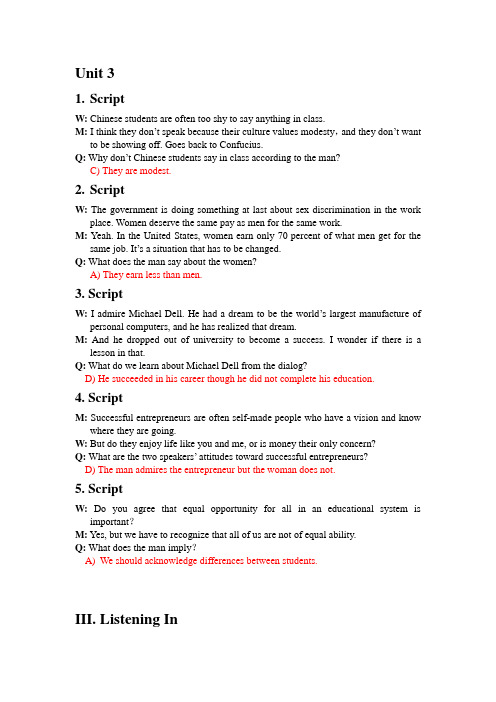
Unit 31.ScriptW: Chinese students are often too shy to say anything in class.M: I think they don’t speak because their culture values modesty,and they don’t want to be showing off. Goes back to Confucius.Q: Why don’t Chinese students say in class according to the man?C) They are modest.2.ScriptW: The government is doing something at last about sex discrimination in the work place. Women deserve the same pay as men for the same work.M: Yeah. In the United States, women earn only 70 percent of what men get for the same job. It’s a situation that has to be changed.Q: What does the man say about the women?A) They earn less than men.3. ScriptW: I admire Michael Dell. He had a dream to be the world’s largest manufacture of personal computers, and he has realized that dream.M: And he dropped out of university to become a success. I wonder if there is a lesson in that.Q: What do we learn about Michael Dell from the dialog?D) He succeeded in his career though he did not complete his education.4. ScriptM: Successful entrepreneurs are often self-made people who have a vision and know where they are going.W: But do they enjoy life like you and me, or is money their only concern?Q: What are the two speakers’ attitudes toward successful entrepreneurs?D) The man admires the entrepreneur but the woman does not.5. ScriptW:Do you agree that equal opportunity for all in an educational system is important?M: Yes, but we have to recognize that all of us are not of equal ability.Q: What does the man imply?A)We should acknowledge differences between students.III. Listening InTask 1: Competition in AmericaScriptAlan: What are you reading, Eliza?Eliza: An article on America competition.Alan: Competition is everywhere. Why so much fuss about it, Miss Knowledge? Eliza:Don’t make fun of me. According to the author, competition is especially important in American life. They’re taught to complete from early childhood.When children play games, they learn how to beat others.Alan: And many girls want to look more attractive than the girls sitting next to them in class. Do you think that way?Eliza: Don’t be silly. Let’s get back to the point. When children are growing up, they complete with one another in their studies.Alan: I sn’t that also true of students in other nations? As we all know, many Asian students would kill for a high test score and grab every opportunity to sharpen their competitive edge over others.Eliza:American boys find great pleasure in competing with each other in sports, according to the author.Alan:I do like sports. When our football team beats the other team, I feel great…makes me want to shout out loud. But isn’t that normal throughout the world? Eliza:American people also compete with each other at work and at climbing the social ladder.Alan: But there’s such competition in other countries as well.Eliza:You’re right in a sense, but the author says the idea of competing is more deeply rooted in the minds of Americans. They’re even taught that if you lose and don’t feel hurt, there must be something wrong with you.Alan: I hear that some Asians put emphasis on cooperation. Which approach do you think makes more sense?Eliza: It’s hard to say. Anyway, it’s just culture difference.Question and key:1.What is the dialog mainly about?C) Varies aspects of American competition.2.What is the woman reading?A) Reading an article on American competition.3.What do children learn from playing games according to the woman?C)Competitiveness.4.What does the man say about Asian and American students?B) Competition exacts among both Asian and American students.5. What does the woman think more sense, competition or cooperation?D) It’s difficult to arrive at a definite conclusion.Task2: Americans’ work ethicScript and keyFor 400 years or more, one thing has been a characteristic of Americans. It is called their“work ethic”. Its (S1) roots were in the teachings of the Christian Puritans who first settled in (S2) what is now the northeastern state of Massachusetts. They believed that it was their (S3) moral duty to work at every task to please God by their (S4) diligence, honesty, attention to details, skill, and attitude. To these Puritans, it was a (S5) sin to be lazy or to do less than your best in any task. They and later Americans tried to follow Bible’s (S6) teachings,“If a man will not work, he shall not eat.”Therefore, American have for (S7) centuries believed that they were guilty of sin if they did not work carefully and hard as they could when they did anything. God would punish those who were careless or lazy in their work. (S8) Even as children they were taught, “If it’s worth doing at all, it’s worth doing well.”But some people have gone beyond the usual sense of diligence. They are especially attracted to the notion of “climbing the ladder”so as to increase their status, financial position, and sense of self-worth.(S9) In English a new word has been created to describe people who work compulsively. The word “workaholic”describes an individual who is as addicted to work as an alcoholic is to alcohol.They are conflicting points of view about workaholics. Those concerned with problems of mental stress believe workaholics abuse themselves physically and mentally. (S10) Others hold that workaholics are valuable members of society because they are extremely productive. The American culture values achievement, efficiency, and production, and a workaholics upholds those values.Task3: Cross-cultural tips on doing businessScriptCountries from around the globe, such as Germany, the U.S., the U.K., and Russia, conduct a lot of business in China-the biggest market in the world. Here are some tips to help you deal more successfully with people from those nations.Firstly, you must be punctual with the Germans. Being even five minutes late makes a poor impression. Being punctual is also very important with Americans and the British. But while it’s important to be on time for business meetings, nobody expects you to be punctual for a social event. Half past seven is really means a quarter to eight, or even eight o’clock! With Russians, always be on time, but don’t be surprised if your Russian contact is very late! It is not unusual for them to be one or even two hours late!In the business environments of those four countries, it is best to wear formal clothes of dark colors. In Russia, designer clothes are rather common. However, don’t be surprised if you go to an office in the U.K., on a Friday and find everyone wearing jeans. Many companies in the U.K. have “dress down Fridays”, when people wear casual attire.In conversation, the British and the Americans love humor and talking about sports. The weather is also a good topic of conversation with the British, but you should avoid political talk. With the Russians, say positive things about their country, and avoid making complaints. The Germans, however, prefer to get straight down to business!Remember that with the Germans, once a deal has been agreed upon, you can’t change it! With the Americans, money is more important than relationships, whereas with Russians it’s important to get to know your contacts well. Also, don’t be surprised if a British meeting seems like a chaos, with everyone participating and giving opinions!Remember these tips and you will be on your way to a successful international career. Question and key:1.What is true of the Americans and the British in term of punctuality?D) They are punctual for business meetings, but less for social events?2.In which country do people have “dress down Fridays”?A) The U.K.3.What can you infer about the Russians from their conversation?D) They are patriotic.4.How can you do business well with the Russians?A) You should know your contacts well.5.What is the speaker’s attitude toward the four nationalities?C) He is neutral to all of them.IV. Speaking OutMODEL 1: Americans glorify individualism.ScriptSusan: John, I was looking for you. Where have you been hiding all morning? John: Well, I caught Professor Brown’s lecture on American individualism. Susan: Oh, how did you find it?John:Enlightening. Americans glorify individualism. They believe (1) individual interests rank above everything else.Susan:Sounds interesting. (2) It’s a sharp contrast to the oriental collectivism Professor Wang talked about last semester.John: But you should know that the individualism in the United States (3)is not necessarily an equivalent for selfishness.Susan: Then what does it mean in the States?John:They believe (4) all values, rights, and duties originate in individuals, so they emphasize individual initiative and independence.Susan:There could be something in that. Of course (5) an oriental countries the interests of the group are more important than anything else.John:So, it’s all the necessary for foreigners to understand American culture, or they can’t hope to understand the importance of privacy in the West. Susan: Maybe that’s the reason nuclear families outnumber extended families in the United States.John:Right on! You’re catching on fast!Susan: Now let me ask you a question.John: Shoot. Go ahead.Susan: (6) Why do Americans cherish individualism more than oriental people? John:I don’t know. Anyway, Professor Brown didn’t say.Susan: One reason might be that American children stop sleeping with their parents at an early age. They learn independence early, so it’s deeply rooted.John:Wow. That’s an intelligent guess!Model2: What do you think are the reasonsfor that difference?ScriptSusan:Do find that people in America often walk faster than people in China?American (1) always seems to be in a hurry.John:It’s hard to come to a definite conclusion. Some Americans walk in a leisurely way, and some Chinese hurry all the time. But on the whole, I think you’re right.Susan: (2) What do you think are the reasons for that difference?John: Americans treasure time. For them, time is tangible. It’s a thing. “Time is money.”You can “spend time”, “waste time”, “save time”. You can even “kill time”!Susan: (3) Does this strong sense of time affect their lifestyle?John:Sure. If you’re 20 minutes late for a business appointment, the other person or persons will be annoyed. They may not trust you anymore.Susan: But as far as I know, English-speaking people may be 15-30 minutes late for a dinner party.John: That’s true. For an informal occasion like that, punctuality is not so important.Also, a boss may keep his employees waiting for a long time.Susan:But if his secretary is late, she’s in trouble. She will probably receive a reprimand.John:How true!Susan: The American worship of time probably (4) let them to create fast food. John: I agree. And (5) globalization shrinks the differences between cultures. Now people everywhere are rushing, and anywhere you go, you find Kentucky Fried Chicken.Susan: But plenty of Chinese are still making appointments saying, “If I am late, wait for me.”John: But with more intercultural, I think (6) the gap will eventually be bridged, and Chinese will be hurrying everywhere.Model3: That’s the secret of their success.ScriptChris: Hey, Sue, how’s the math class going? Are you head of the class?Susan: Are you kidding? There’s a bunch of foreign students in the class-from China somewhere-and (1) they’re on top.Chris:Why do you think so many Chinese students excel in math? It’s been my observation that the Chinese students are usually the best.Susan: In class they don’t say much, but (2) they definitely get the best marks. Chris: I think part of it is their work ethic. (3) They never skip in class, and they pay attention.Susan: One Chinese student in my class (4) did homework each day until the early hours. He never took a break, watched TV, or went out for a beer.Chris: (5) That’s the secret of their success: hard work and diligence.Susan:It’s so unfair. I could probably do better if I worked harder, but that’s no fun. I think learning should be more fun.Chris:Someone with a knowledge of chess would find a chess tournament fascinating. But if you don’t have the knowledge, then you won’t understand the significance of the moves, and you’ll be bored.Susan:So what you’re saying is knowledge requires hard work, and knowledge makes things interesting. I’m not against knowledge; (6) I just want to learn in an interesting way. What’s more, “All work and no play makes Jack a dull boy.“Ⅴlet’s talkInternational Slavery MuseumScriptThe international Slavery Museum has opened at Albert Dock, in Liverpool. Many people travelled from all over the world to celebrate the opening on 23rd of August. The museum is a place of reflection, contemplation and education.It tells the story of the cruel acts of the transatlantic slave trade, the stories of the lives of the millions of Africans people, who were forced from their homelands onto ships that sailed to unknown lands where they were made to work on farms and in mines in harsh conditions without dignity or payment.Liverpool is one of the many British seaports that became very rich from money made transporting goods such as cotton and sugar, produced by African slaves.One of the most important parts of the museum’s exhibits are the stories of the lives of people who live all over the world today, whose family history can be traced to the Africans whose lives were changed forever by the transatlantic slave trade.It has taken four years of the hard work and planning to organise the creation of the museum, and its opening year is a very significant date because in 2007 we commemorate the 200th anniversary of the Abolition of the Slave Trade Act.This was a law made in 1807; it banned all British people from taking part in the slave trade. Later in 1833 all people who had been forced into slavery to work for British companies were freed.Key:1.It tells the story of the cruel acts of the (1) transatlantic slave trade, the stories ofthe lives of the millions of African people, who were forced from their homelands onto ships that sailed to (2) unknown lands where they were made to work on farms and in mines in harsh conditions without (3) dignity or payments.2.Liverpool is one of the many British seaports that became very (1) rich from manymade transporting goods such as (2) cottons and sugar, produced by African slaves.3.One of the most important parts of the museum’s exhibits are the stories of thelives of people who live (1) all over the world today, whose (2) family history can be traced to the Africans whose lives were (3) changed forever by the transatlantic slave trade.4.Because 2007 marks the 200th anniversary of the Abolition of the Slave Trade Act.5. A law made in 1807; it (1) banned all British people from (2) taking part in theslave trade. Later in 1833 all people who had been forced into (3) slavery to workfor British companies were (4) freed.ⅥFurther listening and speakingListeningTask1 PunctualityScriptTo Americans, punctuality is a way of respect for other people’s time. Being more than 10 minutes late to an appointment usually calls for an apology and maybe an explanation. People who are running late often call ahead to let others know of the delay. Of course, the less formal the situation, the less important it is to be exactly on time. At informal get-togethers, for example, people can arrive as much as 30 minutes past the appointed time. But they usually don’t try that at work.American lifestyles show how much people respect the time of others. When people plan an event, they often set the time days or weeks in advance. Once the time is fixed, it takes almost an emergency to change it. If people want to come to your house for a friendly visit, they will usually call first to make sure it is convenient. Only very close friend will just “dropped in”unannounced. Also, people hesitate to call others late at night for fear they might already be in bed. The time may vary, but most people think twice about calling after 10:00p.m.To outsiders, Americans seem tied to the clock. People in some Eastern cultures value relationships more than schedules. In these societies, people don’t try to control time, but to experience it. Many Eastern cultures, for example, view time as a cycle. The rhythm of nature- from the passing of seasons to the monthly cycle of the moon-shapes their view of events. If they have wasted some time or let an opportunity pass by, they are not very worried, knowing that more time and opportunities will come in the next cycle. But Americans often want to jump at the first opportunity. They are unwilling to stand by idly and give up the opportunity.The early American hero Benjamin Franklin expressed that view of time like this: “Do you love life? Then do not waste time, for that is the stuff life is made of.”Question and key:1.When people are running late in America, what do they do?C) They call ahead to inform others of their delays.2.What do Americans do after the time for an appointment is fixed?B) They change it only when there is an emergency.3.How do people in Eastern cultures view relationships and schedules?A) Relationships are more important than schedules.4.Why aren’t some Eastern people worried if they let an opportunity pass by?C) Another opportunity will come in next cycle.5.What was Benjamin Franklin’s view of time?D) It is part of life.Task2: Our personal spaceScriptOur personal space, that piece of the universe we occupy and call our own, is contained within an invisible boundary surrounding our body. As the owners of this area, we usually decide who may enter and who may not. When our space is invaded, we react in a variety of ways. We back up and retreat, stand our ground as our hands become moist from nervousness, or sometimes even react violently. Our response shows not only our unique personality, but also our cultural background.For example, cultures that stress individualism such as England, the United States, Germany, and Australia, generally demand more space than collective cultures do, and tend to aggressive when their space is invaded. The idea of space is quite different from the one found in the Mexican and Arab cultures. In Mexico, the physical distance between people when engaged in conversation is closer than what is usual north of the border. And for Middle Easterners, typical Arab conversations are at close arrange. Closeness cannot be avoided.As is the case with most of our behavior, our use of space is directly linked to the value system of our culture. In some Asian cultures, for example, employees do not stand near their bosses; the extended distance demonstrates respect. Extra interpersonal distance is also part of the cultural experience of the people of Scotland and Sweden, for whom it reflects privacy. And in Germany, private space is scared. Key:1.T2. F3.T4. F5. FTask3: We don’t know what to do with them.ScriptA Russian, a Cuban, an American businessman, and an American lawyer were passengers on a fast train speeding across the French countryside. As time wore on, they gradually became friendly with one another, introducing themselves and shaking hands. Eventually, the Russian took out a large bottle of vodka and poured each of his traveling companions a drink. Just as the American businessman was sipping the vodka and praising its fine quality, the Russian hurled the half-full bottle out of the open window.“What did you do that for?”asked the startled American businessman.“V odka is plentiful in my country,”said the Russian. “In fact, we have thousands and thousands of liters of it-far more than we need.”The American businessman shook his head and leaned in his seat, obviously baffled by the Russian’s reasoning .A little later, the young Cuban passed around a box of fine Havana cigars. The men enjoyed this treat and made admiring remarks about the pleasure of smoking good Havana cigars. At that very moment the Cuban took a couple of puffs of his cigar and then tossed it out of the open window.“I thought the Cuban economy was not good this year,” the American businessman said,“Yet you threw that perfectly good cigar away. I find your actions quite puzzling.”“Cigars,” the Cuban replied, “are a dime a dozen in Cuba. We have more of them than we know what to do with.”The American businessman sat in silence for moment. Then he got up, grabbed the lawyer, and threw him out of the window.Key:1.The Russian hurled the half-full bottle of vodka out of the open window.2.He answered, “V odka is plentiful in my country. In fact, we have thousands andthousands of liters of it-far more we need.”3.The businessman said, “I thought the Cuban economy was not good this year. Yetyou threw that perfectly good cigar away. I find your actions quite puzzling. ”4.He replied, “Cigars are a dime a dozen in Cuba. We have more of them than weknow what to do with.”5.The American businessman sat in silence for moment. Then he got up, grabbedthe lawyer, and threw him out of the window. He did that probably because hethought there were too many lawyers in the United States.Viewing and speakingReviving the image of tea1.Script and keyVoice-over: Walk down any high street and you can’t help noticing the explosion of trendy coffee shops. The old style of cafes are gradually (1) disappearingto make way for the caffeine culture. As people become espresso fiendsand cappuccino connoisseurs, designer coffees are (2) kicking thetraditional British beverage-tea-off the menu. But there are still a fewoases of calm.[On-screen text: Charlotte Grindling.]Voice-over:Charlotte Grindling is a design guru and a tea fanatic.Charlotte:I’ll have a pot of house blend please.Waitress:OK, and a cream.Charlotte:Yes, thank you. Here we are in a quintessentially English (3) tea shop. I love these places. Look, they even give you a doily. But the problem isthat tea is undergoing an (4) image crisis. You think of your granny, teaat four, the flat cap. But with the explosion of the new coffee shopshitting the high street, the question is: How is tea going to (5) update itsimage?Voice-over:One tea manufacturing company saw a niche in the market for a chain of tea shops to (6) compete with the American-style coffee shops thatdominate the high street. But to compete successfully, they needed a teamachine that made quality tea as (7) fast as the coffee machines makecoffee. They turned to the company Design Bridge for help.David: I’m David.Richard:I’m Richard.David:We work for Design Bridge.Richard:And we design things like that.David:And that.Richard:And that.David:Yeah, and that.Richard: And this one.David:In fact, all of these.Voice-over:David and Richard are (8) product designers.They’re responsible for repackaging many familiar high street brands. Repackaging tea was justone of their briefs and it was because of the (9) contacts that they madewith the tea company that they got the job of designing the tea machine. [On-screen text: David Helps.]David:we met up with our client in a place (10) similar to this, and he said he wanted a tea machine to fit into a load of tea shops he was launching theyear after. So he all spun around and looked at that, and said actually Ithink that’s the sort of thing we (11) want.[On-screen text: Richard Rees.]Richard:The trouble is there it’s a beautiful coffee machine. It’s been around for 30 years, it’s got this gorgeous Italian styling: lots of chrome, lots ofstainless steel, but we weren’t sure whether that style was what weneeded for a tea machine. So that was our (12challenge: What’s the rightstyle for a new tea machine?Voice-over:Faced with creating a new product from scratch, David and Richard would need a design brief. The brief is crucial because they need toknow about the (13) consumer before they can design the product. Thereis a (14) traditional way of finding out what the consumer wants andcreating this design brief.。
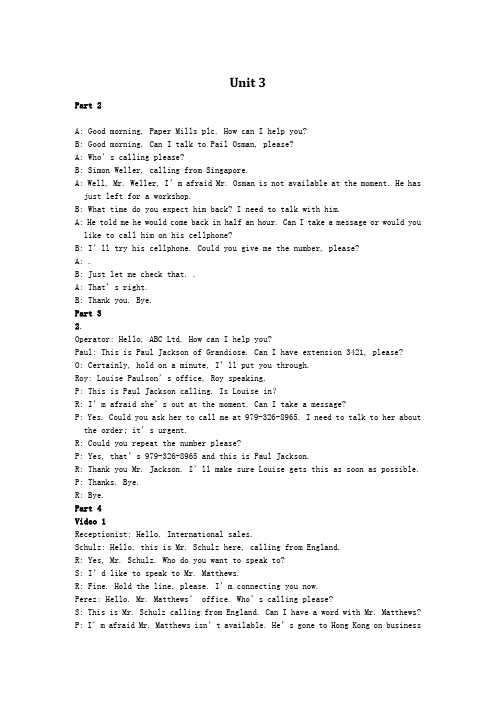
Unit 3Part 2A: Good morning, Paper Mills plc. How can I help you?B: Good morning. Can I talk to Pail Osman, please?A: Who’s calling please?B: Simon Weller, calling from Singapore.A: Well, Mr. Weller, I’m afraid Mr. Osman is not available at the moment. He has just left for a workshop.B: What time do you expect him back? I need to talk with him.A: He told me he would come back in half an hour. Can I take a message or would you like to call him on his cellphone?B: I’ll try his cellphone. Could you give me the number, please?A: .B: Just let me check that. .A: That’s right.B: Thank you. Bye.Part 32.Operator: Hello, ABC Ltd. How can I help you?Paul: This is Paul Jackson of Grandiose. Can I have extension 3421, please?O: Certainly, hold on a minute, I’ll put you through.Roy: Louise Paulson’s office, Roy speaking.P: This is Paul Jackson calling. Is Louise in?R: I’m afraid she’s out at the moment. Can I take a message?P: Yes. Could you ask her to call me at 979-326-8965. I need to talk to her about the order; it’s urgent.R: Could you repeat the number please?P: Yes, that’s 979-326-8965 and this is Paul Jackson.R: Thank you Mr. Jackson. I’ll make sure Louise gets this as soon as possible. P: Thanks. Bye.R: Bye.Part 4Video 1Receptionist: Hello, International sales.Schulz: Hello, this is Mr. Schulz here, calling from England.R: Yes, Mr. Schulz. Who do you want to speak to?S: I’d like to speak to Mr. Matthews.R: Fine. Hold the line, please. I’m connecting you now.Perez: Hello. Mr. Matthews’ office. Who’s calling please?S: This is Mr. Schulz calling from England. Can I have a word with Mr. Matthews? P: I’m afraid Mr. Matthews isn’t available. He’s gone to Hong Kong on businessfor a few days.S: When do you expect him back?P: He’ll be back on Friday afternoon. Is it urgent?S: Yes.P: Can I take a message for him?S: Yes, please. Will you tell him that we’ve just received your sample of the new assembly coffee table and are quite happy with it?P: Sure. It’s very kind of you to say so. Can we expect an order from you?S: That’s why I’m making the call. Please tell Mr. Matthews we’re quite happy with the quality and design of the table, but the price is too high. We need some negotiation on it.P: OK, Mr. Schulz. Anything else?S: One more thing. Please inform Mr. Matthews that I won’t be able to get to your company that early this Saturday because of the rail strike. It’ll probably be afternoon before I arrive.P: No problem. I’ll give him the message.S: Thanks.P: You’re welcome. Goodbye.Part 51(1).Bennett is a famous doctor. Please call him on 875-9368 before you go to see him.(2).Miss Black is on holiday now. The telephone number of the hotel she is staying in in 305-636-8430.(3).The number of the order is 5312/A12.(4).This is John Bartholomew, B-a-r-t-h-o-l-o-m-e-w.(5).The name is Holt & Frier: H-o-l-t and f-r-i-e-r.(6).The name of the company is for Dora, I for Island, N for Northpole, E for Edward, and R for Richard.Part 6Video 2Receptionist: Good afternoon, this is DNM, How can I help you?Mandel: Good afternoon. I’d like to speak to Mr. Miller, please.R: Mr. Miller? Hold on, please. I’ll connect you.Leo Miller: Mr. Miller speaking. Who’s calling please?M: This is Ms. Mandel from BCM. Is this Henry Miller?L: What? Henry Miller? No, this is Leo Miller, in the Sales Department. Henry Miller is in the Customer Relations Office. I’m afraid you’ve dialed the wrong extension.M: Oh, sorry to have interrupted you. Can you give me Henry Miller’s extension, please?L: Sorry, I haven’t got a directory on hand now. Would you mind calling the switchboard again? I’m sorry not to be of more help.M: Oh, OK. It doesn’t matter. I’ll call back to the receptionist. Thank you, anyway.R: Good afternoon. How can I help you?M: Good afternoon. This is Ms. Mandel again. I’m afraid you gave me the wrong extension just now. I want to speak to Henry Miller, not Leo Miller.R: Oh, there are two Mr. Millers in our company. I’m very sorry I didn’t notice that. I’ll put you through right now. Please wait a minute.M: OK. I’m holding.R: Good afternoon. How can I help you?M: It’s me again –Ms. Mandel. I’m still having trouble getting through to Henry Miller. No one is answering his line. I really need to talk to Mr. Miller as soon as possible. We placed an order with you last week, but we have so far heard nothing about it. It’s a rush order, and we need it urgently. Can you help?R: Of course. I’ll go and find him and ask him to ring you immediately. There may be a problem with his line.M: OK, thank you very much.Hello, Mr. Miller, this is Ms. Mandel. Thank you for ringing back. You are hard to get hold of!H: Oh, I’m terribly sorry for the trouble. I was in a meeting and I left my cellphone in my office.M: Oh, OK. Mr. Miller, I’m calling you about…。